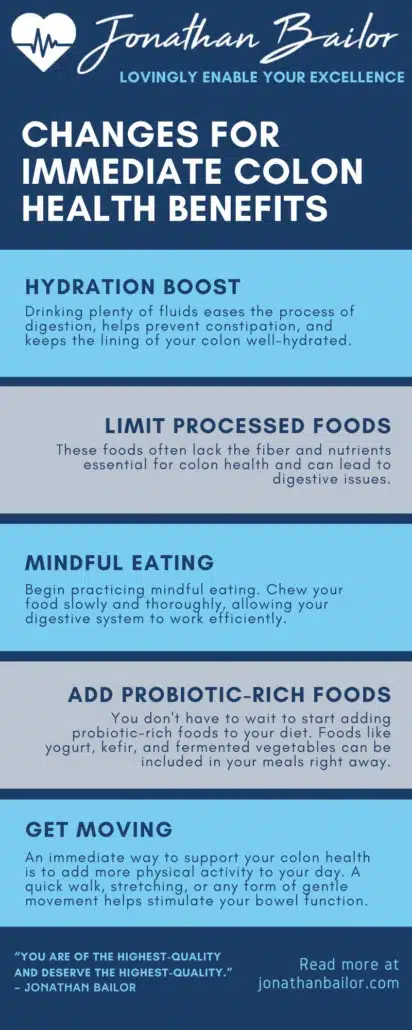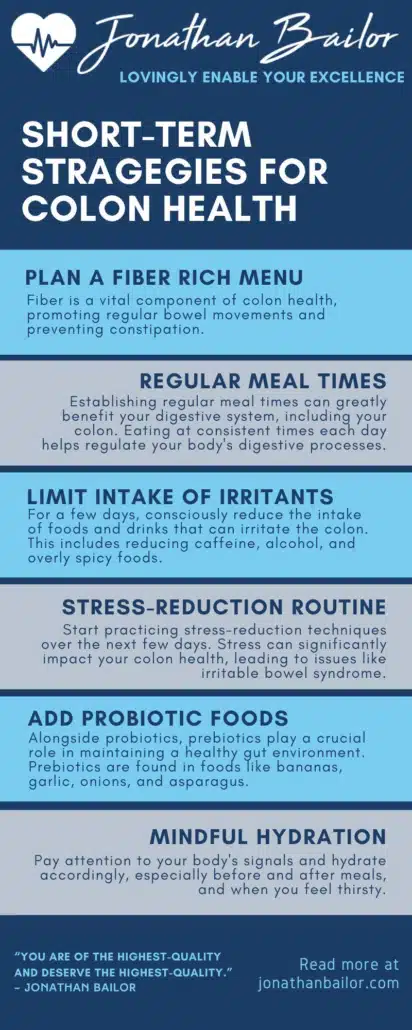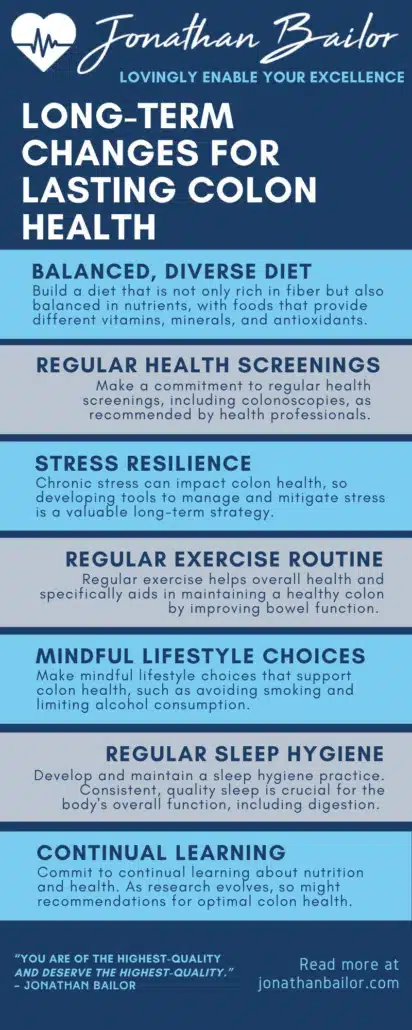Colon Health: 24 Tips to Reduce the Risk of Colon Issues
When it comes to taking care of our bodies, one organ that often flies under the radar is the colon. But did you know that keeping this key part of your digestive system in top shape is vital for your overall health and well-being? Yes, colon health matters at every stage of life, and maintaining it doesn’t have to be complicated or overwhelming.
In this essential colon health guide with Jonathan Bailor, we will walk through easy, everyday tips to ensure your colon is as healthy and happy as possible. Whether you’re in your thriving thirties, fabulous fifties, or beyond, these pointers are designed to fit seamlessly into your life, keeping your digestive health on track.
Don’t forget to dive into our 21 Tips to Improve Colon Health and Reduce the Risk of Colon Issues and Uncovering Wellness: 21 Proven Strategies for Colon Health articles next!
But why should you care about your colon? Well, a healthy colon not only means better digestion but also plays a significant role in nutrient absorption and immune function. Plus, taking care of your colon today can help prevent potential issues down the road.
From simple dietary tweaks to lifestyle habits worth adopting, we’ve gathered the most practical and effective strategies for optimal colon health. And the best part? These tips are easy to share with your friends and family. After all, health is a journey best taken together.
So, grab a cup of your favorite beverage and settle in. Let’s embark on this journey to understanding and improving colon health, one step at a time. It’s a conversation worth having and one that could make a significant difference in the quality of your life and those you cherish. Let’s make colon health a priority starting now!
5 Instant Changes for Immediate Colon Health Benefits
When it comes to enhancing your colon’s health, there’s no need to wait for long-term strategies to take effect. You have the power to make impactful changes right now, today. Immediate adjustments to your daily routine can set the stage for a healthier colon, and the benefits don’t take long to manifest. These simple yet effective changes are not just easy to implement but are also practical for anyone, regardless of age or lifestyle.
In the spirit of taking proactive steps towards better health, here are five immediate changes you can make that will positively influence your colon health. Each of these actions is a small but mighty step towards a healthier you, and the beauty lies in their simplicity and immediate applicability. Let’s jump in and examine these habits that can bring about a significant transformation.
1. Hydration Boost
An easy and immediate change you can make today is to increase your water intake. Drinking enough water is like giving your colon a helping hand. It eases the process of digestion, helps prevent constipation, and keeps the lining of your colon well-hydrated. Aim to drink a glass of water every hour or keep a water bottle handy to sip from throughout the day. It’s a simple yet powerful step towards a healthier colon.
2. Cut Down on Processed Foods
Take a quick look at your pantry and consider reducing your intake of processed foods starting now. These foods often lack the fiber and nutrients essential for colon health and can lead to digestive issues. Instead, reach for a piece of fresh fruit or a handful of nuts for your next snack. This small change can make a big difference in how your colon functions.
3. Mindful Eating Practice
Begin practicing mindful eating at your next meal. Chew your food slowly and thoroughly, allowing your digestive system to work efficiently. This not only aids in digestion but also helps you appreciate and enjoy your food more. By paying attention to your eating, you’re taking a positive step towards better colon health.
4. Incorporate Probiotic-Rich Foods
You don’t have to wait to start adding probiotic-rich foods to your diet. Foods like yogurt, kefir, and fermented vegetables can be included in your meals right away. Probiotics help balance your gut flora, which is crucial for a healthy colon. Simply adding a serving of yogurt to your breakfast or snacking on a small portion of fermented vegetables can kickstart your journey to a healthier digestive system.
5. Get Moving
An immediate way to support your colon health is to add more physical activity to your day. A quick walk, stretching, or any form of gentle movement helps stimulate your bowel function. You don’t need to engage in intense workouts; even light exercises can positively impact your colon health. So, take a short break from sitting and move around – your colon will thank you for it.
Each of these changes is a step towards a healthier colon, and the best part is you can start implementing them right now. Remember, the journey to better health is made up of small, consistent steps. Let’s take those steps together, starting today.

Feeling Better Is Priceless, That's Why We Don't Put A Price On It!
“It’s Like A Free and Medically Valid Version of Noom and Weight Watchers Online”
~ Dr. Doctor Matthew Oleshiak, MD
Click the 'LEARN MORE' button below for free lifetime access to the fast fix program developed by Jonathan and top Ivy League Medical Doctors
LEARN MOREP.S. It's not a free trial. It's not part of the program for free. The entire program is free, forever, for real! No credit card needed.
Short-Term Strategies for Enhanced Colon Health
As we journey further into improving our colon health, let’s focus on changes that can be integrated over the course of a few days. These short-term strategies are slightly more involved than immediate actions but are just as crucial for fostering a healthier colon. Think of them as stepping stones, laying a solid foundation for long-term digestive wellness. They are manageable adjustments to your daily routine, each bringing its own unique benefits to your overall colon health. Over the next several days, you can easily incorporate these changes into your life, paving the way for a healthier, happier colon.
Here are six short-term changes to consider, each designed to support and maintain the health of your colon effectively.
1. Plan a Fiber-Rich Menu
Over the next few days, plan your meals to include a variety of fiber-rich foods. Fiber is vital to colon health, promoting regular bowel movements and preventing constipation. A lack of dietary fiber is one of the major colorectal cancer risk factors. Look for fresh vegetables, fruits, and legumes you enjoy and incorporate them into your daily meals. Planning ahead makes it easier to include these foods in your diet and helps you get the recommended daily fiber intake.
2. Schedule Regular Meal Times
Establishing regular meal times can greatly benefit your digestive system, including your colon. Eating at consistent times each day helps regulate your body’s digestive processes. Try to have your meals around the same time each day for the next few days, allowing your digestive system to establish a routine. This regularity can aid in smoother digestion and improved colon health.
3. Limit Intake of Irritants
For a few days, consciously reduce the intake of foods and drinks that can irritate the colon. This includes reducing caffeine, alcohol, and overly spicy foods. These substances can disrupt the delicate balance of your digestive system and may lead to discomfort or irritation in the colon. Observing how your body responds to this change can provide insights into what works best for your colon health.
4. Begin a Stress-Reduction Routine
Start practicing stress-reduction techniques over the next few days. Stress can significantly impact your colon health, leading to issues like irritable bowel syndrome. Techniques like deep breathing, meditation, or gentle yoga can effectively manage stress. Set aside a few minutes each day to engage in these activities, creating a calming routine that benefits both your mind and your colon.
5. Introduce Prebiotic Foods
Alongside probiotics, prebiotics play a crucial role in maintaining a healthy gut environment. Prebiotics are found in foods like bananas, garlic, onions, and asparagus. Try adding these to your meals over the next few days to nourish the beneficial bacteria in your gut. Probiotic and prebiotic foods promote good colon health by contributing to a balanced gut microbiome.
6. Mindful Hydration
While immediate changes include drinking more water, a short-term strategy involves mindful hydration. Pay attention to your body’s signals and hydrate accordingly, especially before and after meals and when thirsty. This conscious approach to hydration over the next few days can enhance digestive processes and support colon health.
These short-term changes are designed to create a positive impact on your colon health within a few days. They’re not just beneficial for your digestive system but also contribute to your overall sense of well-being. Let’s take these steps together, embracing the journey towards a healthier you.

Medium-Term Adjustments for Sustainable Colon Health
As we continue our journey to improve colon health, let’s explore adjustments that can be made over a few weeks. These medium-term changes are about solidifying good habits and making subtle yet effective modifications to our lifestyle. Think of these as investments in your colon’s future health, providing lasting benefits and setting the stage for a robust digestive system. These changes require a bit more commitment and time to integrate, but they are crucial for maintaining the health and functionality of your colon. Over the next few weeks, embracing these adjustments can significantly enhance your colon’s well-being.
Here are six medium-term changes to consider, each designed to further support and nurture your colon’s health.
1. Develop a Regular Exercise Routine
If you haven’t already, start developing a regular exercise routine. Physical activity is not just beneficial for your overall health, but it also plays a significant role in promoting healthy bowel movements. Aim for at least 150 minutes of moderate-intensity exercise per week. This can include walking, swimming, cycling, or any other activity you enjoy. Consistent exercise over the next few weeks will help enhance your colon function and overall health.
2. Experiment with a Variety of Probiotic Strains
While immediate changes include introducing probiotics, over the next few weeks, try experimenting with different strains of probiotics. Different strains offer various benefits, and finding the right balance can be key to optimal colon health. You can do this by trying different probiotic supplements or incorporating a variety of fermented foods into your diet. Observe how your body responds and adjust accordingly.
3. Gradual Dietary Fiber Increases
Over the next few weeks, gradually increase your dietary fiber intake. This helps your digestive system adjust without causing discomfort that can sometimes accompany a sudden increase in fiber. Include a variety of fiber sources like fruits, vegetables, legumes, and nuts. Aim for a gradual increase that feels comfortable and sustainable.
4. Mindful Eating Habit Formation
Take these weeks to solidify the practice of mindful eating. To ensure healthy eating habits, it is important to be mindful of your body’s hunger signals, eat slowly and deliberately, and fully immerse yourself in the enjoyment of your meals without any distractions. Mindful eating can improve digestion and help you tune into your body’s needs, which is beneficial for colon health.
5. Regular Sleep Pattern
Establish and maintain a regular sleep pattern. Quality sleep is crucial for overall health and directly impacts your digestive system. Aim for 7-9 hours of sleep per night and try to go to bed and wake up at the same time each day. Consistent sleep patterns over the next few weeks can positively affect colon health.
6. Manage and Monitor Stress Levels
Continue to build upon your stress management techniques and monitor your stress levels over these weeks. Chronic stress can take a toll on your colon health, so finding effective ways to manage it is essential. Whether it’s through meditation, deep breathing exercises, or engaging in a hobby, consistent stress management can have lasting benefits for your colon.
By committing to these medium-term changes, you’re not only taking steps toward a healthier colon but also toward a healthier lifestyle. These changes, though they might take a few weeks to become habits, are powerful tools in maintaining your digestive health and overall well-being. Let’s embrace these changes together, knowing that each step we take is a step towards lasting health.

Long-Term Commitments for Lifelong Colon Health
Embarking on a journey for better colon health isn’t just about making quick fixes; it’s about committing to long-term changes that lay the foundation for lasting well-being. These changes, integrated over months, become ingrained habits, part of the fabric of your daily life. They require patience, persistence, and a deeper understanding of how your choices impact your colon health. Think of these long-term commitments as nurturing your body’s needs and gradually building a stronger, healthier digestive system that will serve you well for years to come.
Let’s explore seven long-term changes you can make, each fostering an environment for optimal colon health and reflecting your dedication to a healthier you.
1. Build a Balanced, Diverse Diet
Over the months, focus on building a diet that is not only rich in fiber but also balanced in nutrients. This involves including a diverse range of foods that provide different vitamins, minerals, and antioxidants. A varied diet supports a healthy gut microbiome, which is crucial for colon health. Experiment with new foods, explore different cuisines, and find enjoyable ways to include a variety of nutrients in your meals.
2. Establish Regular Health Screenings
Commit to regular health screenings, including colonoscopies, as health professionals recommend. Early detection of any potential issues is key to maintaining colon health. These screenings should become a routine part of your healthcare regimen, reflecting your commitment to long-term health.
3. Cultivate Stress Resilience
Over the coming months, work on building resilience to stress. This can involve deeper practices like cognitive-behavioral techniques, regular participation in stress-reducing activities, or engaging in supportive social relationships. Chronic stress can impact colon health, so developing tools to manage and mitigate stress is a valuable long-term strategy.
4. Consistent Exercise Routine
Solidify a consistent exercise routine that you enjoy and can sustain. This doesn’t mean rigorous daily workouts but rather a regular pattern of physical activity that suits your lifestyle and preferences. Regular exercise contributes to overall health and specifically aids in maintaining a healthy colon by improving bowel function and reducing inflammation.
5. Mindful Lifestyle Choices
Over time, make mindful lifestyle choices that support colon health. This includes avoiding smoking, limiting alcohol consumption, and being aware of any medications or supplements that could affect your digestive system. These choices might require sacrifices or adjustments but are integral to maintaining long-term colon health.
6. Regular Sleep Hygiene Practice
Develop and maintain a sleep hygiene practice. Consistent, quality sleep is crucial for the body’s overall function, including the digestive system. Establishing routines such as a regular bedtime, creating a comfortable sleep environment, and minimizing screen time before bed can significantly contribute to colon health.
7. Continual Learning and Adaptation
Commit to continual learning about nutrition and health. As research evolves, so might recommendations for optimal colon health. Stay informed, be open to adapting your habits, and consult with healthcare professionals to ensure your practices align with the latest findings.
By adopting these long-term changes, you’re not just investing in your colon health; you’re investing in a future of vibrant well-being. These commitments, built over months, become a natural part of your daily life, leading to a healthier, more fulfilled you. Let’s take these steps together, embracing the journey and the rewards that come with it.

FAQs on Lower Colon Health
Navigating the intricacies of lower colon health can often lead to questions, some common and others more specific. Understanding this vital part of your digestive system is key to maintaining overall health and well-being. Here, we address five frequently asked questions about lower colon health, providing clear, straightforward answers to help you on your journey to a healthier digestive system.
Q1: What are the signs of an unhealthy lower colon?
Signs of an unhealthy lower colon can vary but often include symptoms like irregular bowel movements, constipation, diarrhea, abdominal pain, bloating, and, in some cases, blood in the stool. Bowel disorders like inflammatory bowel disease and irritable bowel syndrome are also signs of an unhealthy lower colon. In addition, colorectal cancers are a sign of significantly poor colon health. If you experience persistent discomfort or any significant changes in your bowel habits, it’s important to consult with a healthcare professional. These symptoms could be indicative of various conditions that require medical attention.
Q2: How can I naturally improve my lower colon health?
Improving your lower colon health naturally involves a combination of dietary, lifestyle, and behavioral changes. Incorporating a diet rich in fiber from fruits, vegetables, and legumes, staying adequately hydrated, and engaging in regular physical activity are crucial steps. In fact, these foods are part of a colon-healthy diet and can help prevent colon cancer. Additionally, managing stress and establishing regular eating and sleeping patterns can positively impact your lower colon health.
Q3: Can certain foods harm my lower colon?
Yes, certain foods can harm your lower colon, especially those that are highly processed or high in fat and sugar. These foods can disrupt the balance of gut bacteria and lead to inflammation, contributing to various digestive issues. It’s beneficial to limit or avoid excessive consumption of processed meats, fried foods, and sugary snacks to maintain a healthy lower colon.
Q4: What role does stress play in lower colon health?
Stress can have a significant impact on your lower colon health. It can disrupt the natural rhythm of your digestive system, leading to symptoms like cramping, bloating, and changes in bowel movements. Chronic stress can exacerbate conditions like irritable bowel syndrome (IBS) and negatively affect the gut microbiome. Managing stress through relaxation techniques, exercise, and adequate sleep can help mitigate these effects.
Q5: Is regular exercise beneficial for lower colon health?
Absolutely! Regular exercise is highly beneficial for lower colon health. It helps stimulate intestinal activity, reducing the time food waste spends in the colon, which can help prevent constipation and maintain regular bowel movements. Physical activity also promotes overall well-being, which indirectly benefits your lower colon. Even moderate activities like walking or yoga can positively affect your digestive health.
Understanding and taking care of your lower colon is crucial to maintaining your overall health. Remember, it’s always best to consult with a healthcare professional for personalized advice and treatment if you have specific concerns or symptoms.
Embracing a Healthier Tomorrow: Share the Gift of Knowledge
As we conclude our exploration of colon health, remember that the steps we take today pave the way for a healthier tomorrow. Whether it’s immediate changes, short-term adjustments, medium-term adjustments, or long-term commitments, each action contributes to your overall well-being.
We invite you to share this valuable knowledge with your friends and family. Spread the word on social media platforms and through email. Let’s create a community of health and wellness together. Your journey towards better colon health could inspire others to embark on their own path to well-being. Share, care, and connect—because health is a journey best shared with loved ones.
Feeling Better Is Priceless, That's Why We Don't Put A Price On It!
“It’s Like A Free and Medically Valid Version of Noom and Weight Watchers Online”
~ Dr. Doctor Matthew Oleshiak, MD
Click the 'LEARN MORE' button below for free lifetime access to the fast fix program developed by Jonathan and top Ivy League Medical Doctors
LEARN MOREP.S. It's not a free trial. It's not part of the program for free. The entire program is free, forever, for real! No credit card needed.




